In honor of the 85th Academy Awards, AwardsLine is spotlighting memorable moments and winners from the last eight decades. This is the final installment, Part 3: The Directors.
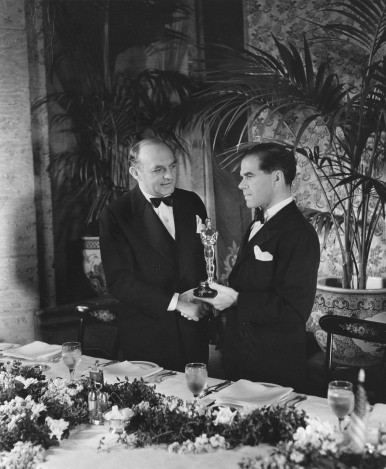 Frank Capra, 1939: The 11th Academy Awards took place Feb. 23, 1939, in downtown Los Angeles’ Biltmore Hotel. Although no specific emcee steered the ship, the evening began with a rendition of “The Star-Spangled Banner,” and Basil Rathbone introduced Frank Capra as president of the Academy. Just days before, Capra had threatened to resign and boycott the ceremony in an effort to get the studios to recognize the Screen Directors Guild. He ended up prevailing over Motion Picture Producers Association president Joe Schenck—going so far as to follow him to Santa Anita Racetrack after Schenck missed a scheduled meeting. Capra’s film You Can’t Take It With You won picture and directing prizes; Spencer Tracy (Boys Town) and Bette Davis (Jezebel) won lead acting prizes; and supporting honors went to Walter Brennan for Kentucky and Fay Bainter for Jezebel.
Frank Capra, 1939: The 11th Academy Awards took place Feb. 23, 1939, in downtown Los Angeles’ Biltmore Hotel. Although no specific emcee steered the ship, the evening began with a rendition of “The Star-Spangled Banner,” and Basil Rathbone introduced Frank Capra as president of the Academy. Just days before, Capra had threatened to resign and boycott the ceremony in an effort to get the studios to recognize the Screen Directors Guild. He ended up prevailing over Motion Picture Producers Association president Joe Schenck—going so far as to follow him to Santa Anita Racetrack after Schenck missed a scheduled meeting. Capra’s film You Can’t Take It With You won picture and directing prizes; Spencer Tracy (Boys Town) and Bette Davis (Jezebel) won lead acting prizes; and supporting honors went to Walter Brennan for Kentucky and Fay Bainter for Jezebel.
“My third Oscar for best directing left me so stunned, I remember little of my ‘thank you’ mumblings. The rest of the program was a blur. But when Jimmy Roosevelt opened the best picture envelope and broke the suspense with, “And the best picture of the year is You Can’t Take It With You!”, my poor numbed brain tail-spinned into total amnesia.
“The crazy events of the past week: Chasing Joe Schenck to the racetrack; the strike vote, my resignation and boycott of the Academy; the last-minute producers’ agreement that called them off, that put the Directors Guild in business; the whole wonderful Academy Banquet that climaxed in my third best director and my second best picture Oscars—these were the events that simply reaffirmed a lifelong belief: Everything that happens to me happens for the best.”—Frank Capra on his Oscar wins, from his 1971 autobiography The Name Above the Title. His previous wins were for 1934’s It Happened One Night and 1936’s Mr. Deeds Goes to Town.
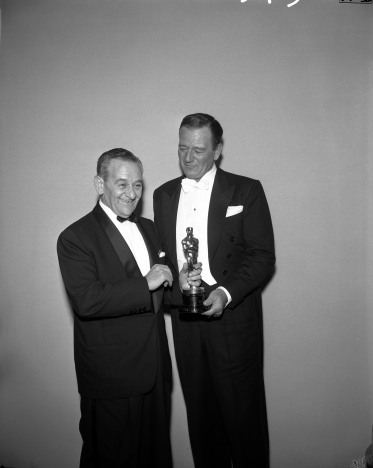 William Wyler, 1960: The 32nd Academy Awards took place April 4, 1960, at the Pantages Theater in Hollywood and was hosted by Bob Hope. MGM’s Ben-Hur won 11 of the 12 Oscars for which it was nominated, including picture and director for William Wyler, lead actor for Charlton Heston, and supporting actor for Hugh Griffith. It was the second year in a row that the Culver City studio took home best picture after previously winning for Gigi, and Ben-Hur broke the record of most Oscars in a single evening. Lead actress honors went to Simone Signoret—the first actress to win for a foreign film—for Room at the Top, while the supporting Oscar was awarded to Shelley Winters for The Diary of Anne Frank.
William Wyler, 1960: The 32nd Academy Awards took place April 4, 1960, at the Pantages Theater in Hollywood and was hosted by Bob Hope. MGM’s Ben-Hur won 11 of the 12 Oscars for which it was nominated, including picture and director for William Wyler, lead actor for Charlton Heston, and supporting actor for Hugh Griffith. It was the second year in a row that the Culver City studio took home best picture after previously winning for Gigi, and Ben-Hur broke the record of most Oscars in a single evening. Lead actress honors went to Simone Signoret—the first actress to win for a foreign film—for Room at the Top, while the supporting Oscar was awarded to Shelley Winters for The Diary of Anne Frank.
“My deepest appreciation to Sam Zimbalist and Joe Vogel for their confidence, and to my fellow members of the Academy for this [raising the Oscar]. Thank you.”—William Wyler (left, with John Wayne) earned his third career Oscar for directing Ben-Hur. His previous directing wins were for 1942’s Mrs. Miniver and 1946’s The Best Years of Our Lives.
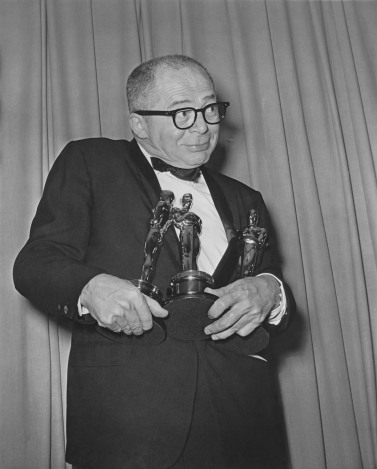 Billy Wilder, 1961: The 33rd Academy Awards took place April 17, 1961, at the Santa Monica Civic Auditorium, with the ever-present Bob Hope serving as emcee. It was the first time the show had taken place outside of Los Angeles or Hollywood in three decades. The ceremony also marked the beginning of ABC’s half-century association with the Oscars, with ABC winning broadcast rights to the show. Billy Wilder won picture and director Oscars for The Apartment, though neither of his nominated actors, Shirley MacLaine nor Jack Lemmon, earned trophies. Best actor was Burt Lancaster, and supporting actress was Shirley Jones, both for Elmer Gantry; lead actress went to Elizabeth Taylor for Butterfield 8; and supporting actor was Peter Ustinov for Spartacus.
Billy Wilder, 1961: The 33rd Academy Awards took place April 17, 1961, at the Santa Monica Civic Auditorium, with the ever-present Bob Hope serving as emcee. It was the first time the show had taken place outside of Los Angeles or Hollywood in three decades. The ceremony also marked the beginning of ABC’s half-century association with the Oscars, with ABC winning broadcast rights to the show. Billy Wilder won picture and director Oscars for The Apartment, though neither of his nominated actors, Shirley MacLaine nor Jack Lemmon, earned trophies. Best actor was Burt Lancaster, and supporting actress was Shirley Jones, both for Elmer Gantry; lead actress went to Elizabeth Taylor for Butterfield 8; and supporting actor was Peter Ustinov for Spartacus.
“Thank you so much, you lovely discerning people. Thank you.”—Billy Wilder accepting his directing trophy for The Apartment, which earned a total of five Oscars that night. Wilder also won the Irving G. Thalberg Memorial Award in 1987 at the 60th Academy Awards.
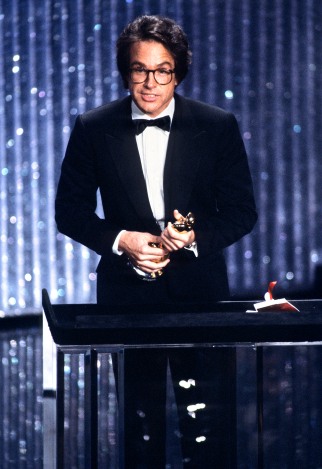 Warren Beatty, 1982: The 54th Academy Awards were held March 29, 1982, at the Dorothy Chandler Pavilion, hosted by Johnny Carson, who had held the reins since 1979. The two major prizes were split, with Chariots of Fire earning best picture and Warren Beatty winning for directing Reds, a film that some thought would win both awards. Henry Fonda won best actor for On Golden Pond, though he was too frail to attend the ceremony; Katharine Hepburn won her fourth Oscar for her lead in the same film; John Gielgud won a supporting trophy for Arthur; and Maureen Stapleton won for her supporting role in Reds. After thanking two other nominees, Jack Nicholson and Diane Keaton, in his acceptance speech, Beatty turned his attention to the studio executives who greenlit his film.
Warren Beatty, 1982: The 54th Academy Awards were held March 29, 1982, at the Dorothy Chandler Pavilion, hosted by Johnny Carson, who had held the reins since 1979. The two major prizes were split, with Chariots of Fire earning best picture and Warren Beatty winning for directing Reds, a film that some thought would win both awards. Henry Fonda won best actor for On Golden Pond, though he was too frail to attend the ceremony; Katharine Hepburn won her fourth Oscar for her lead in the same film; John Gielgud won a supporting trophy for Arthur; and Maureen Stapleton won for her supporting role in Reds. After thanking two other nominees, Jack Nicholson and Diane Keaton, in his acceptance speech, Beatty turned his attention to the studio executives who greenlit his film.
“I do want to name Mr. Barry Diller who runs Paramount, Mr. Dick Zimbert who’s been very kind to me, Mr. Frank Mancuso, and Mr. Charles Bluhdorn who runs Gulf + Western and God knows what else. And I want to say to you gentlemen that no matter how much we might have liked to have strangled each other from time to time, I think that your decision, taken in the great capitalistic tower of Gulf + Western, to finance a 3½-hour romance which attempts to reveal for the first time just something of the beginnings of American socialism and American communism, reflects credit not only upon you, I think it reflects credit upon Hollywood and the movie business wherever that is. And I think that it reflects more particular credit on the freedom of expression that we have in our American society and the lack of censorship that we have from the government or the people who put up the money. Thanks.”—Warren Beatty accepting his directing trophy for Reds. He also took home the Irving G. Thalberg Memorial Award in 1999.
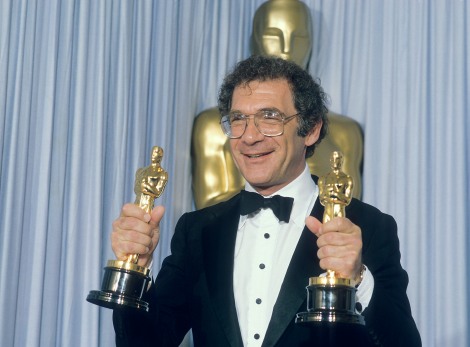 Sydney Pollack, 1986: The 58th Academy Awards took place March 24, 1986, at the Dorothy Chandler Pavilion, with Jane Fonda, Alan Alda, and Robin Williams serving as hosts. Sydney Pollack’s Out of Africa won seven Oscars out of 11 total nominations, a virtual sweep, although neither of its nominated leads—Meryl Streep nor Robert Redford—won for their roles. Lead actor honors went to William Hurt for The Kiss of the Spider Woman, and lead actress was Geraldine Page for The Trip to Bountiful. Don Ameche earned the supporting actor Oscar for Cocoon, while Anjelica Huston took home a supporting actress trophy for Prizzi’s Honor.
Sydney Pollack, 1986: The 58th Academy Awards took place March 24, 1986, at the Dorothy Chandler Pavilion, with Jane Fonda, Alan Alda, and Robin Williams serving as hosts. Sydney Pollack’s Out of Africa won seven Oscars out of 11 total nominations, a virtual sweep, although neither of its nominated leads—Meryl Streep nor Robert Redford—won for their roles. Lead actor honors went to William Hurt for The Kiss of the Spider Woman, and lead actress was Geraldine Page for The Trip to Bountiful. Don Ameche earned the supporting actor Oscar for Cocoon, while Anjelica Huston took home a supporting actress trophy for Prizzi’s Honor.
“Thank you very much. Frank Price made this film possible. He had the courage when it mattered the most and was easy to say no. I knew it was impossible to get a screenplay from this material, so I didn’t try; Kurt Luedtke didn’t know it was impossible and so he did it. David Rayfiel kept us honest. Meryl, Bob, Klaus, and Malick brought those characters to life and made an incredible world. All of us being helped all the time by Terry Clegg who kept us going. I had a team of editors who locked themselves in a room with me seven days a week, 12 hours a day and behaved as though nothing else in the world existed. John Barry made it all sing. Karen Blixen lived that life and turned it into art and taught a generation a new way to write prose. My wife, Claire, gave me more encouragement than I have any right to have, put up with more, was more tolerant. I’m indebted to all of them. I can’t leave this podium without saying, I could not have made this film without Meryl Streep. She is astounding personally, professionally, in all ways, and I can’t thank her enough. Thank you.”—Sydney Pollack accepting his directing Oscar for Out of Africa, for which he won a second producing trophy that same evening when the film was named best picture.

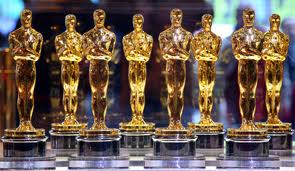
Of those listed, I liked Warren Beatty’s the best. There should never be censorship.